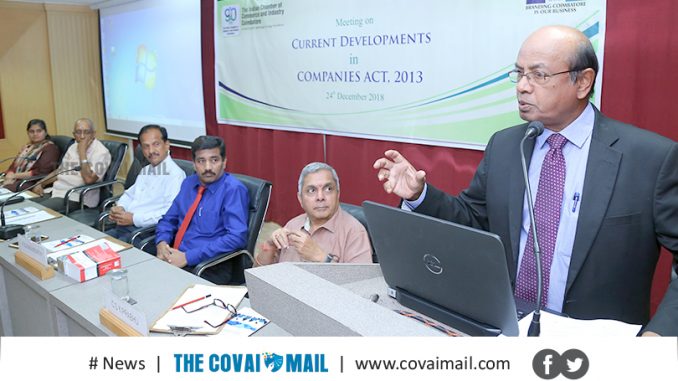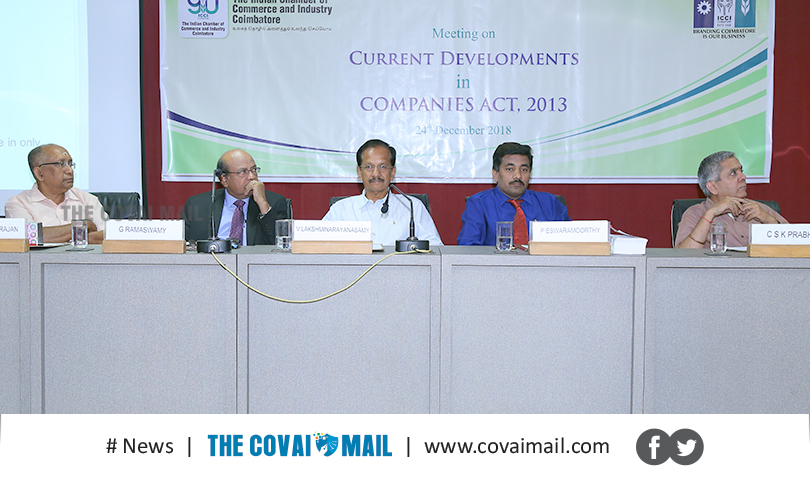
 The Indian Chamber of Commerce and Industry, Coimbatore organized a meeting on “Current Developments in Companies Act 2013” to its members and associates recently in the Chamber Towers.
The Indian Chamber of Commerce and Industry, Coimbatore organized a meeting on “Current Developments in Companies Act 2013” to its members and associates recently in the Chamber Towers.

G.Ramaswamy, Charted Accountant and Past President, Institute of Charted Accountants of India first addressed the gathering and spoke on the topic “General Corporate Governance for Family Oriented Business”.
He said Family Owned Companies (FOC) must conduct the no. of proper board meetings under the Companies Act 2013. But during these days FOCs don’t conduct proper board meetings at all. Only at the last minute they conduct meetings, complete minutes and so on. Today most of the private limited companies are FOCs and a majority of it would be run by the senior most person in the family who, if he lacks the adequate updated knowledge of the law, will not only lead himself into trouble but the entire family and the people who have vested interest in the company.
Throughout India, many FOCs suffer due to this inadequacy of knowledge like proper filing of documents and compliance with IT. Only when a notice comes from the Registrar of Companies will they know they are in trouble. Earlier, announcing insolvency was not too complicated. Members went to Board of Industrial and Financial Reconstruction first but now they have to deal with Insolvency and Bankruptcy Code which is hectic. He subtly hinted that the person with contemporary knowledge of company laws should helm the FOCs.
He cautioned that Forensic Audit is effective in India and the government has given authority to Central Board of Direct Taxes, Enforcement Directorate and CBI to retrieve data from a company’s database to monitor for non-compliance. From your smart-phone to your server, all your data is available to the government for verification. “The government is the biggest hacker for all your computers”. He further said that no data is truly deleted and there are specialized personnel in the government who can retrieve it easily and for deleting such data, according to the Information Technology Act, 2000 the concerned party could be charged. He finished his speech by saying that working in a transparent manner is the only option.
Following him, Eswaramoorthy, Company Secretary, Coimbatore spoke on “Board of Directors and their responsibilities” He advised the gathering to treat the funds and properties of the company as the properties of a separate entity. Using the funds of the company and then reimbursing it is a practice he wished the directors to give up. He proposed that meeting the auditor on different periods of the year would really help the company to sail safe. Most of all he wanted the directors to make sure their company follows the Companies Act 2013 on all sides. He advised the directors to not take advantage of their companies and work in the interest of the company and its shareholders first. He requested them to take care of the filing of balance sheets and Annual returns in time with the Ministry of Corporate Affairs & take care of their Corporate Social Responsibility.
An interesting topic titled “One Person Company” (OPC) was spearheaded by Richa Thakkar, Charted Accountant, Coimbatore. This innovative concept, she said, would be of great help to start-ups, women entrepreneurs and self-help groups to get their needed loans from the banks when they declare their company as OPC. This OPC- concept will give an individual a corporate status when he requests for loans. For this there should be on a minimum one person as a director (and it could be extended to 15 later by following certain conditions). Incorporating as OPC is very simple, first a person has to obtain digital signature certificate and then get the Director Identity Number, select the company name, draft the articles, followed by Memorandum of Association and electronically signing it and submitting it to Registrar of Companies with the fee, that’s all.

Before the end of the event, M.R.Thiyagarajan, Company Secretary , Chennai shared a few words. He counseled to not compromise the interest of the shareholders when the directors try to avail exemptions. And he warned that if the company is a defaulter, it cannot apply for exemption at all.
